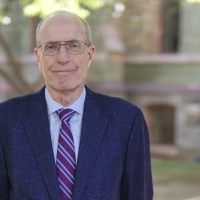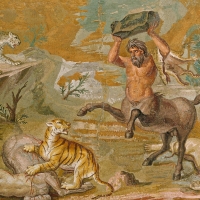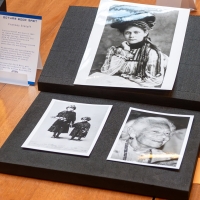A Welcome Message from Interim Dean Jeffrey Kallberg
Kallberg, who began his tenure as Interim Dean on January 1, reflects on the “impressive” way the School closed out 2024 and looks ahead to what comes next.

Archaeological Science, Hands On
The Center for the Analysis of Archaeological Materials, a joint endeavor between Penn Arts & Sciences and the Penn Museum, celebrates 10 years of teaching students how to interpret the past in an interdisciplinary context.

Nurturing a Love for Math
A new book by Professor of Mathematics Robin Pemantle and longtime math teacher Henri Picciotto offers middle and high school educators actionable materials and invites reflection and connection across disciplines.
The Monstrous and Mythical
In his book “Centaurs and Snake-Kings: Hybrids and the Greek Imagination,” Jeremy McInerney, Professor of Classical Studies, investigates the power of hybridity in myth.
Natural Science, Social Science
Research Roundup: Fruit Fly Mating, Airbnbs and Crime, and More
In the first 2025 edition of this series, we examine “wing spreading,” how a popular homestay accommodation increased robberies in London, how to reduce votes lost in the mail, and spending on home care.
From Periodic Table to Libretto
Growing up the child of a famous scientist, Karyl Charna Lynn, CW’65, was expected to follow her father’s path. She pursued chemistry throughout her schooling, but when she started writing about opera, she knew she’d found her passion.
Processing the Past
A hands-on graduate-level internship course co-taught by Zita Nunes, Associate Professor of English, and Holly Mengel, Head of Archives and Manuscripts Processing at Penn Libraries, reveals the complex world of academic archiving.
Humanities, Natural Science, Social Science
2024 Year in Review
As the calendar flips to 2025, we look back at a few of the dozens of stories we had the privilege of sharing this past year.
Print Edition
Fall/Winter 2024

This issue features leaders in the climate change fight, a look at the storied career of David Wallace and the evolution of Penn Arts & Sciences under Dean Fluharty, Quaker Quotes, a “genius grant,” and so much more.
Penn Arts & Sciences in the News
BBC
How Biden Tarnished his Own Legacy
January 12, 2025
Associate Professor of History Brent Cebul argues that President Biden spent too much time on efforts that American workers wouldn’t feel for years. “The time horizon associated with those big pieces of legislation was way out of sync with the exigencies of the presidential election,” Cebul says.
The Associated Press
Earth Breaks Yearly Heat Record and Lurches Past Dangerous Warming Threshold
January 10, 2025
The year 2024 was the hottest on record, the first to pass a 1.5°C temperature increase. Michael Mann, Presidential Distinguished Professor of Earth and Environmental Science described what we’re seeing now as like watching the end of a dystopian sci-fi film. “We are now reaping what we’ve sown,” he says.
The New York Times
The Character-Building Tool Kit
January 9, 2025
In an opinion piece, columnist David Brooks references work by Angela Duckworth, Rosa Lee and Egbert Chang Professor, stating that forming character means building strength of the heart, the mind, and the will.
Newsweek
Cancer Breakthrough As ‘Speckles‘ May Reveal Best Treatment
January 3, 2025
“Speckle” patterns in the heart of tumor cells could reveal how individuals with a common form of kidney cancer—called clear cell renal cell carcinoma—will respond to treatment, according to research from Shelley Berger, Daniel S. Och University Professor, and colleagues. “The search for answers may lead to more personalized treatments,” Berger says. “This discovery offers a new starting point” for this type of cancer.













